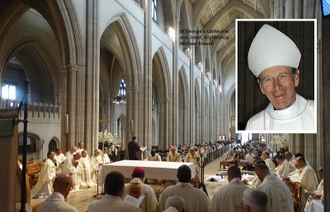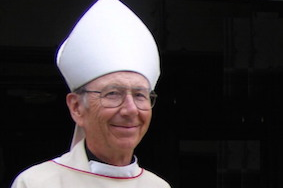Text: Homily at Requiem Mass for Archbishop Michael Bowen

The Right Reverend Richard Moth, Bishop of Arundel and Brighton gave the following homily at the Requiem Mass for Archbishop Michael Bowen in St George's Cathedral, Southwark on 4 November 2019.
My dear brothers and sisters,
We gather today to offer the Holy Sacrifice of the Mass for a much-loved family member, for a dear friend and Bishop who has given to each one of us, each our different ways, so very much.
To Sue, Joanna, Kate, Rosie, Fr George and all the family I offer the sincere condolences of everyone here in the Cathedral today and many others who are unable to be with us. You are all very much in our prayers and we remember also in our prayers John & Masie, Archbishop Michael's parents, Paul and his brother, Pat and other members of the family who have already gone before us, marked with the sign of faith.
For me, Michael was always "Your Grace". As his private secretary and his vicar general, I could never quite do for Michael or Micky; but he was, for me, my second father in this life and it is a great privilege to be allowed to say a few words here today.
This is not the moment, I suggest, to read out the list of achievements of a fruitful life of service that have appeared in obituary notices. We can read these in our own time and they help us remember. I think we all know that Michael would not have sought a eulogy or panegyric. I shall try not to preach one, but I might fail. Rather, I hope that some reflections on the Sacred Scriptures - along with some personal reflections - will assist us in our prayers for the repose of the soul of a much-loved man, for that is our purpose today - to offer the Holy Sacrifice of the Mass, the greatest prayer that we have, this moment when the Lord is truly with us, for the repose of His soul. I am certain that it is our prayers that Michael values more than anything else, for he was, at heart, a man of simplicity and great humility and our prayers are the greatest gift we can offer.
He believed strongly in family, spending as much time with them as responsibilities would allow and welcoming them to Storrington and here to Archbishop's House. I am sure that one of the joys of retirement lay in being able to give more time to family and friends, especially his brother, Pat. Today is a time when we pray for each other at this time of loss.
Isaiah, in today's first reading, speaks of the wonder of the Kingdom of Heaven in terms of a banquet, perhaps with a glass of wine or two. Michael, after so many years of devoted service to the Church, is - we pray - enjoying that banquet and is, no doubt, advising on the quality of the wine, reminding everyone that of all the wine of Bordeaux, Graves will mature more quickly! This promise of rest and repose in the presence, for eternity, of the Father who loves us is the very purpose of our lives and, for one who gave himself in the service of parishes, in the formation of priests, in so many roles in the Bishops' Conference, with the Equestrian Order of the Holy Sepulchre and two dioceses - often at some considerable personal cost - we pray today that this promise, held out to us all, is a reality for Michael.
The second reading speaks very clearly of the ministry of the ordained - especially of the Bishop. "Be the shepherd of the flock that is entrusted to you, watch over not simply as a duty, but gladly, because God wants it." To be called to be a Bishop aged only 40 was a very serious demand. Michael did, I believe, understand duty - perhaps from his father's example and from his period of service with the Irish Guards. But there was something more. "God wanted it" and the response to God's call ultimately brings a joy that puts duty in the shade. Many times, I saw this sense of purpose as he moved around parish halls after Confirmation Masses and other events - his tiredness at the end of a busy day hidden by a ready smile and a genuine interest in the lives of others. He was a gentleman in the true sense of that word - I and many others in this Cathedral Church today will have lost count of the number of times we have heard that word 'gentleman' in recent weeks. Michael was never, ever, a "dictator over any group that had been put in his charge." He allowed things to grow from the ground up, willing to put up with the occasional mistakes and willing, too, to allow things to fail sometimes - more importantly to empathise with people who failed. He was an example that many have sought to follow. All was done, in my experience and I am sure in the experience of everybody here today, with the greatest gentleness. As Cardinal Basil Hume said, at Michael's Silver Jubilee at Aylesford: "Southwark has been blessed to be served by a gentle shepherd." Arundel & Brighton experienced that gentleness too and we would all do well to cherish and nurture this particular gift that Michael shared with us.
There is a book about the ministry of bishops, written by Pope St. Gregory the Great, entitled "Pastoral Care." It is a hard book for bishops to read, because we realise as we go through it the many shortcomings we have. It is addressed to a Bishop and concerning the life and ministry of one called to be a successor of the Apostles, in his description of the character of one called to the office of Bishop, writes: "He is not led to covet the goods of others, but is bounteous in giving of his own. He is quickly moved by a compassionate heart to forgive." All will hold in mind and heart our experiences of Michael's care and compassion - we give thanks for it and our thanksgiving must prompt us to pray for him.
In today's Gospel, Jesus speaks to us of the need to be open to His Word as a child - eager to learn, uncluttered by cynicism and ready to live and love in simplicity of heart. To see another who seeks simplicity is a gift for us. It is true that Michael could worry and agonise over things - spending many hours, for instance, pondering over clergy moves and the difficulties and worries of so many in the Diocese who contended with the challenges of life. The occasional meeting that demanded a stricter approach could really take it out of him. He would go the extra mile - one example comes to mind: that of one asylum seeker, due to be deported back to almost certain death in his country of origin but saved through Michael's intervention. This is but one of many examples. It is true, too, that once a decision was made, he would stand firm. In all of these things, he did, I believe, seek to approach things with a core simplicity. He could be at home saying nothing, rather than say something of no value. He was not one to push himself forward, seeking the limelight. Humility and simplicity marked his ministry and life - and much good humour. The ready smile, the twinkling eye put us all at our ease and, for those who worked closely with him, there was occasionally time for a very well-thought out practical joke! I had been serving as his secretary for about a week when he asked me if I liked chocolate. "Yes, Your Grace," I said. He disappeared into a cupboard and some chocolate appeared on my side plate. I look up to see him chuckling away to himself, his shoulders going up and down. I said, "Your Grace, what's wrong?" "Oh," he said, "it's been in the cupboard for two years." Recreation played a part in his life too, golf, tennis played and watched on TV. Even boxing on occasion.
There were always, always thanks - a word, a card or letter. Many of of us will have received such notes and cards and cherished them. An example that we can all follow - not just towards our brothers and sisters, but in our thanksgiving to God, from Whom flows all that is good.
However, the burden of Pastoral Office is great - that of Episcopal Office even more so. His years in Arundel & Brighton and more so in Southwark saw many changes in the Church and a very real increase in the breadth of responsibility and the number of demands placed upon Bishops. The "Yoke" - the "Cross" - that the Lord called him to bear was, at times heavy. Prayer and the celebration of Mass supported him in these many demands - here in Archbishop's House, the Divine Office and Private Mass before breakfast as a matter of routine and discipline, ensured that the compass remained true to its course. He would pray Midday Prayer at the desk in the office - the tip of his letter knife following the lines of the psalms - enabled him to keep the Lord before his eyes as the day progressed. He found rest in the Lord in prayer.
It was, I suggest, his spirit of self-effacing simplicity that led him to retire so quietly to the flat on Blackheath. There will be many who wish he had been around a little more, but - rather like John the Baptist, he was happy to grow less. He was, certainly, tired after thirty-three years service as Bishop, a quarter of a century of that time as Archbishop of Southwark. He enjoyed the flat and improved his cooking skill - though he never mastered the computer. Declining health was born with characteristic lack of fuss and bother and for someone who had, over the years, enjoyed the company of sisters, that final months at the Little Sisters at Vauxhall will have been a great consolation to him.
We pray today that the words of the Lord, "I will give you rest" are true for Michael, one of the family, pastor, a Bishop, a friend and father in Christ. May he rest in peace.

















